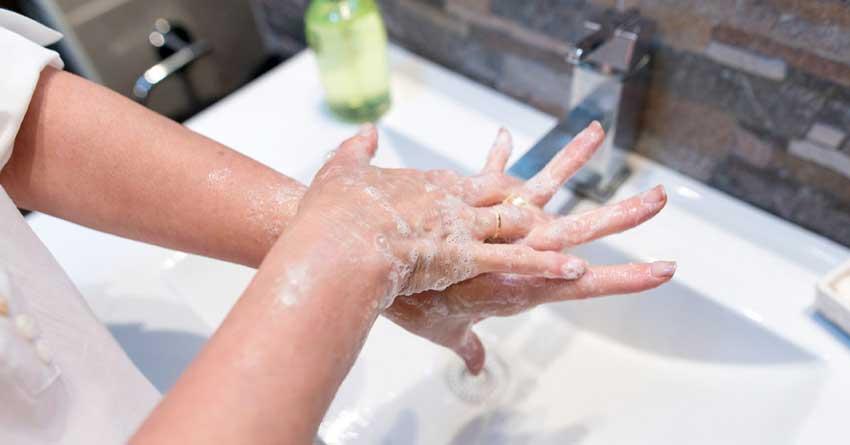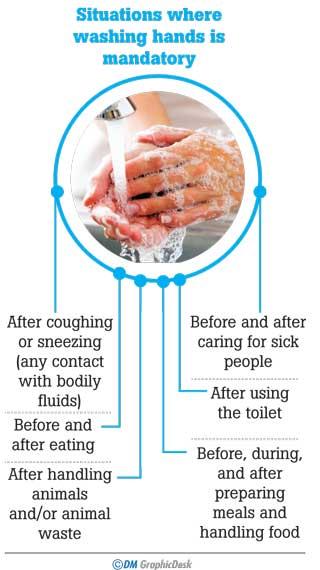14 May 2021 - {{hitsCtrl.values.hits}}

 Some years ago, washing hands throughout the day was simply a good habit and a regular practice of cleanliness. The benefits of handwashing were merely posters found on the walls of primary school classes. However, in this battle against the COVID-19 pandemic, handwashing has become a first-line defense strategy to curb the spread of infectious pathogens. The general public can play a critical role in fighting COVID-19 by adopting frequent hand hygiene as part of their day-to-day practices.
Some years ago, washing hands throughout the day was simply a good habit and a regular practice of cleanliness. The benefits of handwashing were merely posters found on the walls of primary school classes. However, in this battle against the COVID-19 pandemic, handwashing has become a first-line defense strategy to curb the spread of infectious pathogens. The general public can play a critical role in fighting COVID-19 by adopting frequent hand hygiene as part of their day-to-day practices.
 Among several COVID-19 initiatives promoting hand hygiene, the World Health Organization’s “SAVE LIVES: Clean Your Hands” (SLCYH) global campaign focuses on hand hygiene in health care and is celebrated on 5 May every year. It was launched in the year 2009, and the central core of this campaign is that all healthcare workers should clean their hands at the right time and in the right manner, and now the campaign involves all members of the community as we are battling a pandemic.
Among several COVID-19 initiatives promoting hand hygiene, the World Health Organization’s “SAVE LIVES: Clean Your Hands” (SLCYH) global campaign focuses on hand hygiene in health care and is celebrated on 5 May every year. It was launched in the year 2009, and the central core of this campaign is that all healthcare workers should clean their hands at the right time and in the right manner, and now the campaign involves all members of the community as we are battling a pandemic.
The theme for 2021 is “achieving hand hygiene at the point of care”. The point of care is where the 3 factors, the patient, health care workers, and treatment surroundings involving contact with patients, all come together.
COVID-19 virus primarily spreads through droplet and contact transmission. Contact transmission means touching infected people and/or contaminated objects or surfaces. Thus, your hands can spread the virus to other surfaces and/or to your mouth, nose, or eyes if you touch them.
The World Health Organization recommends washing hands with clean running water, and soap when the hands are visibly dirty. Under the current circumstances, even if the hands are not visibly dirty, periodically cleansing them with an alcohol-based hand sanitizer, or with soap and water is recommended.
The alcohol-based hand sanitizers should contain at least 60% of alcohol to serve the purpose effectively. While using the hand sanitizer rub, the hands must be cleaned thoroughly for at least 20 seconds, and while washing hands with soap and water, the process should take at least 40 seconds. An easy way to remember and practice this is to sing the “happy birthday” song, twice, from start to finish, while washing hands.
The WHO urges the policymakers to the necessary infrastructure, such as handwashing stations, to allow people to effectively perform hand hygiene in public places, and to support hand hygiene supplies and practices in health care facilities. Many supermarkets and public spaces in Sri Lanka, such railway stations have accommodated hand washing stations, and the public should use these facilities mindfully.
Diarrhoeal diseases and many other contagious diseases too can be prevented from spreading in the community by adhering to proper hand hygiene practices. Let us do our part to battle COVID-19, a simple act of practicing proper hand hygiene can go a long way.
19 Apr 2024 8 minute ago
19 Apr 2024 42 minute ago
19 Apr 2024 50 minute ago
19 Apr 2024 2 hours ago
19 Apr 2024 3 hours ago